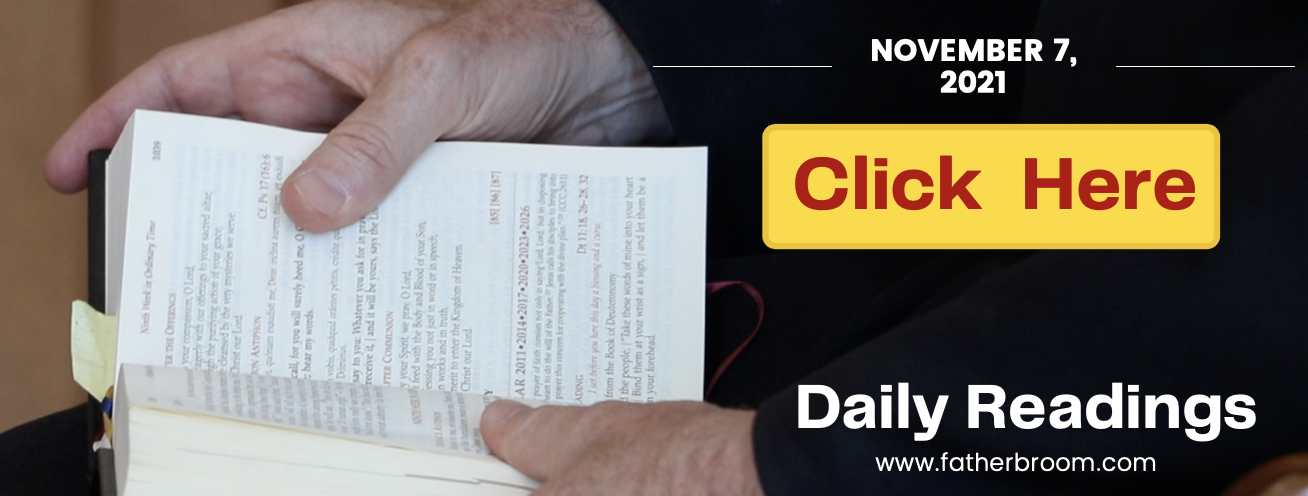Thirty-second Sunday in Ordinary Time



“For greater things you were born.” (Ven. Mother Luisita)
SUNDAY, November 7th Mk. 12:38-44 “A poor widow also came and put in two small coins worth a few cents.”
- There was no paper money at the time of Christ – Syrian, Roman, and Jewish coins were the common currency. According to Biblical scholars, the outer wall of the temple treasury was fitted with trumpet-shaped receptacles where people placed their offerings. Large offerings created a clamoring echo in the horn as the coins cascaded to an opening at the bottom and then into a secure strongbox.
- Those making large offerings would draw the attention of those standing by. Whereas the offering of the widow’s two small coins wouldn’t be noticed by anyone, except Jesus who sees everything, even the intentions of our heart. It is this contrast to which the Lord draws our attention. Related to the Gospel, we can examine ourselves on three points.
- FIRST, do we have a right intention in the practice of our faith – in our prayers, our sacrifices, and our good works? Jesus says, “Beware of practicing your piety before men in order to be seen by them; for then you will have no reward from your Father who is in heaven.” (Mt 6:1)
- We grow in right intention by praying for the grace, and by rejecting discouragement! Yes, our intentions are not as pure as we would like. Yes, our motives may be mixed. But St. John Vianney reminds us, “God commands you to pray, but He forbids you to worry!” What we lose in purity of heart, we can gain in humility! Let us consecrate our prayers, sacrifices, and good works each day to Our Blessed Mother, knowing our tainted gifts will be well-received by her Son when they come from her hands!
- SECOND, are we generous in giving of our means and of ourselves? Do we give from our surplus or from our poverty, like this widow? In other words, do we give until it hurts? And not just money, though it’s important to support our parish and worthy charities. Do we give of ourselves – of our time and abilities – starting in our home and family, then reaching out to others as we are able? Do we live to serve or to be served? Where is our heart? Are we compassionate? Is our heart finely tuned to the sufferings of others, like the Hearts of Jesus and Mary? Are we quick to give an encouraging word? Do we readily extend a helping hand? Do we carry the concerns and needs of others in our heart, bringing them before the Lord in our prayers?
- Jesus promised: “Give, and it will be given to you. A good measure, pressed down, shaken together and running over, will be poured into your lap. For with the measure you use, it will be measured out to you.” (Lk 6:38)
- THIRD, do we sincerely strive to give God what is due to Him – nothing less than loving Him with all our heart, all our mind, all our soul, and all our strength! Do we love Him as He asked to be loved: “If you love me, keep my commandments.” (Jn 14:15) First, there are the Ten Commandments. They are part of our Examination of Conscience before each confession. Do we go to Confession frequently – every two to three weeks? Confession cleans the window of our soul so we can see ourselves and Jesus more clearly. We are the sinner who will always be forgiven, and Jesus is our merciful Savior who will always forgive us, no matter how far we have strayed from Him!
- Beyond keeping the Ten Commandments, Jesus asks of us loving obedience to God’s holy will. St. Ignatius calls this a spirit of detachment or Holy Indifference – the perfection of conforming ourselves to Christ who always did the will of His Father!
- At the Last Supper, after washing the feet of the disciples and while they were reclined at table, Jesus said: “A new commandment I give you, love one another. As I have loved you, so must you love one another.” (Jn 13:34) Do we receive with a merciful and loving heart every person Jesus puts in our path, even the most difficult and challenging? Do we accept with a willing spirit all He permits to happen each day in our life? Do we do what God wills and not what we prefer? Do we accept God’s vision for our life or do we create our own???
Ignatian Holy Indifference:
Man is created to praise, reverence, and serve God our Lord, and by this means to save his soul.
The other things on the face of the earth are created for man to help him in attaining the end for which he is created.
Hence, man is to make use of them in as far as they help him in the attainment of his end, and he must rid himself of them in as far as they prove a hindrance to him.
Therefore, we must make ourselves indifferent to all created things, as far as we are allowed free choice and are not under any prohibition. Consequently, as far as we are concerned, we should not prefer health to sickness, riches to poverty, honor to dishonor, a long life to a short life. The same holds for all other things.
Our one desire and choice should be what is more conducive to the end for which we are created.
- Let us beg now for the grace to grow in right intention, generosity in giving of our means and of ourselves, and loving obedience to God’s holy will by practicing Holy Indifference, preferring all that God prefers and has chosen for us, for our eternal salvation and the salvation of the whole world.
- God sees what others cannot see – what is in our heart and what it costs us to give our “widow’s mite.” St. Faustina give us these words of wisdom:
“As the soul continues to immerse itself more deeply into the abyss of its nothingness and need, God uses His omnipotence to exalt it. If there is a truly happy soul upon earth, it can only be a truly humble soul. At first, one’s self-love suffers greatly on this account, but after a soul has struggled courageously, God grants it much light by which it sees how wretched and full of deception everything is. God alone is in its heart. A humble soul does not trust itself, but places all its confidence in God. God defends the humble soul and lets Himself into its secrets, and the soul abides in unsurpassable happiness which no one can comprehend.” (St. Faustina Diary 593)